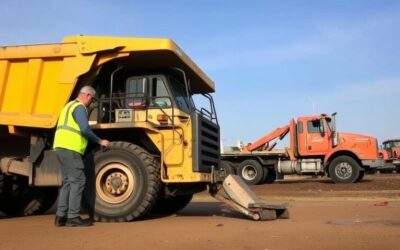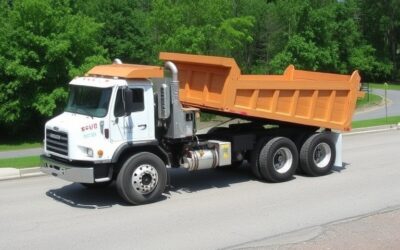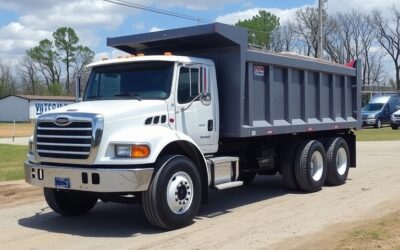Dump trucks are the backbone of industries like construction and mining, but their heavy loads come with one major risk—tipping. One of the biggest dangers is tipping over, which can lead to severe accidents, injuries, and even fatalities. Ensuring the safety of these trucks is crucial for protecting both workers and equipment.
Tipping accidents often happen when the truck is unloading materials. As the dump bed rises, the truck becomes top-heavy and unstable. Rough terrain, uneven loads, and sudden movements can all contribute to a higher risk of tipping. These accidents can cause significant damage to the truck and its surroundings, leading to costly repairs and downtime.
To address these risks, many companies are turning to advanced safety solutions like anti-tip gear. This technology helps prevent dump trucks from tipping over by monitoring stability and making automatic adjustments. By using anti-tip gear, operators can work more confidently and safely, knowing that their trucks are less likely to experience dangerous accidents. In this article, we will explore the importance of dump truck safety, key features of anti-tip gear, how it works, and the benefits of implementing this technology in your fleet.
Understanding the Importance of Dump Truck Safety
Dump truck safety isn’t just important—it’s critical for protecting operators and preventing costly accidents. Driving a dump truck carries inherent risks, especially when dealing with heavy loads and unstable ground. Tipping can lead to severe injuries or fatalities, making safety measures indispensable.
Secondly, dump truck accidents can cause significant damage to the vehicle and the worksite. Repairing a tipped-over truck is costly and time-consuming, leading to prolonged downtime. This not only impacts project timelines but also increases operational costs. Preventing these accidents helps keep projects on schedule and within budget.
Another critical aspect is the safety of other workers and the surrounding environment. A tipping dump truck can cause debris to scatter, potentially harming nearby workers and damaging equipment. By prioritizing safety, we can create a safer work environment for everyone involved.
Lastly, regulatory compliance and insurance considerations necessitate a focus on safety. Companies must adhere to safety regulations to avoid fines and legal complications. Implementing anti-tip technology can help meet these requirements and reduce insurance premiums by demonstrating a commitment to safety.
Key Features of Anti-Tip Gear
Anti-tip gear comes loaded with features that make dump trucks safer and more stable. One of the main features is the use of sensors that constantly monitor the truck’s balance and load distribution. These sensors detect even minor shifts that could lead to tipping, providing real-time data to the system.
Another important feature is the automatic lowering mechanism. When instability is detected, the system triggers the lowering of the dump bed. Lowering the center of gravity helps stabilize the truck, making it less likely to tip over. This automatic response is crucial in preventing accidents before they occur.
Anti-tip gear also includes warning alerts for operators. These alerts notify the driver when the truck is approaching a tipping point, giving them the chance to adjust their actions. This feature empowers operators to make informed decisions and avoid risky situations.
Durability and ease of integration are also key features. Anti-tip systems are built to withstand the harsh conditions of construction and mining sites. They are designed to be easily integrated with existing truck systems, making it simple for companies to upgrade their fleets.
By understanding these features, we can see how anti-tip gear provides a comprehensive solution for maintaining dump truck stability and safety.
How Anti-Tip Gear Works to Prevent Accidents
Anti-tip gear constantly monitors your dump truck’s stability and automatically takes action to prevent tipping. The system uses sensors placed strategically around the truck to keep track of various parameters like tilt angle, load distribution, and ground stability. These sensors send real-time data to the central control unit, which analyzes the information to detect any signs of potential tipping.
When the system identifies a risk, it automatically engages the lowering mechanism. The hydraulic system lowers the dump bed, reducing the height of the load and bringing the center of gravity down. This adjustment helps to stabilize the truck quickly, reducing the chance of a tip-over.
Additionally, if the sensors detect a tip risk, the system will alert the driver with visual and auditory warnings. These alerts inform the operator that immediate action is required to prevent an accident. This dual approach of automatic adjustment and operator alerts ensures that the truck remains safe and stable, even in challenging conditions.
Benefits of Implementing Anti-Tip Technology in Your Fleet
Adding anti-tip technology to your fleet doesn’t just reduce accidents—it boosts safety, cuts costs, and keeps projects on track. With the technology’s ability to detect instability and take immediate corrective action, operators can work more confidently, knowing their trucks are safer.
Another major benefit is the reduction in operational costs. Tipping accidents can be expensive, resulting in high repair costs and downtime. By preventing these incidents, anti-tip technology helps keep your trucks on the road and your projects on schedule. This efficiency can lead to long-term cost savings and improved profitability.
Enhanced safety and reduced accidents also mean fewer insurance claims and lower premiums. Insurance companies recognize the value of safety technologies and often offer discounts for fleets that employ advanced safety features like anti-tip gear. This is an added financial incentive to invest in this technology.
Anti-tip gear also extends the lifespan of your trucks. By ensuring they operate more safely and efficiently, you reduce wear and tear. Lowering the frequency of accidents and repairs means your trucks remain in better condition for longer, further stretching your investment.
Conclusion
Upgrading your dump trucks with anti-tip gear is a smart investment, reducing tipping accidents and keeping your operations safe. This advanced technology provides real-time monitoring and automatic adjustments to prevent tipping accidents. By incorporating features like stability sensors, automatic lowering mechanisms, and operator alerts, it addresses multiple safety challenges effectively.
The benefits of implementing anti-tip technology are clear. It enhances safety for operators and surrounding workers, reduces costly accidents and downtime, lowers insurance premiums, and extends the lifespan of the trucks. These advantages make a compelling case for upgrading your fleet with this important safety feature.
Safety should always be a top priority, especially in industries involving large, heavy vehicles like dump trucks. To learn more about how anti-tip technology can benefit your operations, consider reaching out to Wink Anti Tip. Let us help you keep your fleet safe and efficient with our advanced anti-tip solutions.





